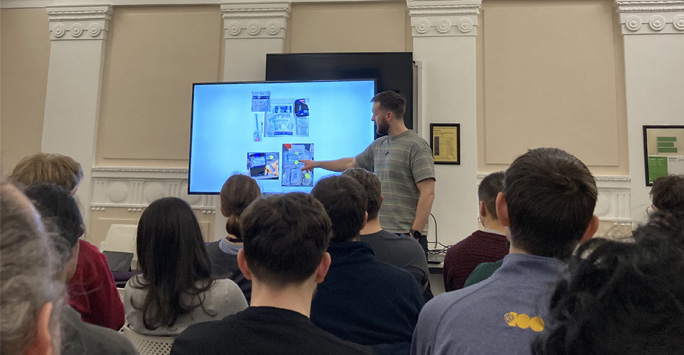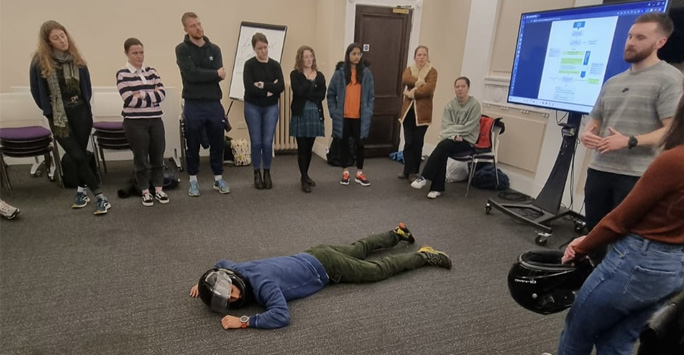
The Liverpool Wilderness Medicine Society welcomed Dr Gregory Smith for an insightful session on trauma medicine, which covered everything from Motorsport and road traffic collisions to aeromedical trauma care.
Dr Smith is a trainee in the Acute Care Common Stem (ACCS) programme, specialising in Emergency Medicine at Aintree. The event offered student doctors the opportunity to hear firsthand from Dr Smith as he shared his compelling stories and valuable insights gained from treating trauma patients. Student Doctor Jess Johnstone Pratt, President of Liverpool Wilderness Society, talks us through the event and how to get involved in Pre-Hospital Emergency Medicine.
Insights into Trauma Medicine
“Last week, Dr Gregory Smith kindly gave a talk to Liverpool Wilderness Medicine Society about his experiences working in a prehospital environment. Everything from treating motorsport trauma at the Isle of Man TT to aviation medicine as well as his time working with the North Wales Air Ambulance.
Dr Smith covered a wide range of topics including how to use common day-to-day medical equipment, the factors to consider during triage and extrication and shared several cases he had seen.
In addition to explaining how to become involved in event medicine, he gave us an opportunity to get hands-on learning the best technique to stabilise a patient’s C-spine to remove a motorcycle helmet. He also discussed some of the most frequent causes for Air Ambulance call outs in North Wales and surprisingly cows came top of the list!

Working in Pre-Hospital Emergency Medicine
Dr Smith is an Acute Care Common Stem (ACCS) trainee at Aintree University Hospital specialising in Emergency Medicine and was attracted to Prehospital Emergency Medicine (PHEM) as it is unpredictable, and he enjoys working in a fast-paced environment.
“The patients you see are often highly complex due to the dangerous mechanisms of injury which means you have to be really focussed.”
He would highly recommend a career in PHEM and said it had given him so many opportunities.
A highlight of the talk
The highlight of the talk for me was hearing about Dr Smith’s experiences working with the North Wales Air Ambulance. As I have a keen interest in aviation and medicine, being able to potentially combine both as a job would be something I would love to do.
Although it can be a highly stressful and emotionally challenging role, the thought of being able to provide high quality care to the most unwell patients really appeals to me.
One of the unique points about PHEM is the versatility within the job itself and where it could take you. For example, you could work all over the world as an expedition medic or provide medical support for sporting events or for charities such as BASICs and the Air Ambulance. The range of possibilities is incredibly varied, and you can focus your job on what really interests you.
How can others get involved in PHEM?
PHEM was only relatively recently recognised as a subspeciality and is not normally something that you get a lot of exposure to during medical school. It is highly competitive, and it can be difficult to gain relevant experience to become a strong candidate when applying for specialist training.
One of the best things for me was joining Liverpool Wilderness Medicine Society. I have had so many opportunities that I may otherwise not have been able to experience such as taking part in national student competitions, attending prehospital conferences or being able to volunteer to be cut out of cars for the Fire Service!
I have loved being part of Liverpool Wilderness (although I am slightly biassed!) and would highly recommend anyone considering emergency medicine as a career to get involved!”
Discover More
- Get involved with Liverpool Wilderness Medicine Society (link) and see what adventures and opportunities await!
- Find out more about the PHEM curriculum via the General Medical Council’s website (link).